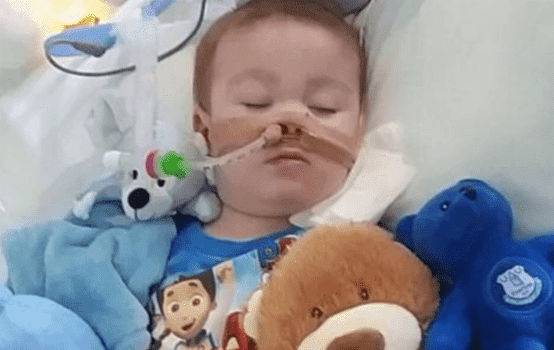
The world is mourning for Alfie Evans, a British two-year-old who this weekend passed away at Liverpool’s Alder Hey Children’s Hospital.
Alfie had an extremely rare neurodegenerative disease, one which doctors decided was impossible to cure or reverse. After they determined it was best to take the boy off ventilation and to allow him to “pass away peacefully,” in opposition to Alfie’s parents, they fought for (and were granted) legal control of Alfie’s life, and took him off life support.
Alfie’s parents, Kate James and Tom Evans, fought the hospital tooth and nail. After they procured Italian citizenship and a spot at Rome’s Bambino Gesu hospital (as well as the support of the Pope) for their son, they asked the courts to allow them to travel with Alfie to Italy, transferring him out of British care. On Wednesday, that petition was refused. For the past several days, the family, the hospital, and the world have waited and watched.
Alfie Evans defied expectations. Doctors suggested that Alfie would pass away immediately once taken off ventilator support. But the little toddler lived for nearly a week without that support—and during that time, drew the prayers of supporters from around the globe.
This case was, in many ways, a simple parental rights issue: if parents believe their son should get further treatment and have the means to do so, as Kate James and Tom Evans did, how could the court possibly refuse them the right to care for their own child? As Rod Dreher put it last week, “Shouldn’t the presumption be that a child’s best interest is to live, not to die — especially when there are resources being made available to pay for the child’s further treatment and care, at no cost to the British Crown?” Unless there were some hidden cruelty involved in James’ and Evans’s wishes (which there was not), how could the court obstruct their right to extend care for their son?
This is the most tragic, unjust, and angering aspect of Alfie Evans’s death. As Megan McArdle put it on Twitter this weekend:
Some parents demonstrate that they don’t care, and in that case, a court properly intervenes. But we should always err on the side of the parents and family, because none of us wants our fate decided by a disinterested expert. We want it decided by people who love us.
— Megan McArdle (@asymmetricinfo) April 27, 2018
And also because killing someone’s child is the worst thing you can do to a human being. The state should not do that to people who will have to live with the agony of watching their child killed in front of them by “disinterested experts”.
— Megan McArdle (@asymmetricinfo) April 27, 2018
The parental rights questions involved in Alfie Evans’ case have been strongly argued and thoroughly discussed by multiple sources. They have been the primary focus of U.S. conservatives interested in the case—understandably, and justifiably.
But the medical questions involved in this case, under the surface of its legal arguments, are much trickier. And while I don’t doubt that Alfie Evans’s parents should have been enabled to care for him, and that—from a legal perspective—this is a parental rights case, I also believe we must pay attention to those deeper questions of care and treatment. Because as the world of medicine expands and deepens, offering us options that heretofore never existed, these cases are likely to grow in complexity and quantity.
The legal arguments surrounding the hospital’s ability to act in loco parentis and assume control over Alfie’s care pointed out stark differences between Alfie’s parents and his doctors’ beliefs surrounding his condition. Doctors believed Alfie was dying. He had been on life support for over a year, and during that time had been slipping deeper and deeper into a semi-vegetative state, they said. Alfie’s parents, however, believed their toddler was only ill, and that they needed time to explore further treatment options.

Doctors saw no chance for recovery: the toddler’s neuro-degenerative case was unique, they said, with causes that were still undiagnosed. According to testing they had conducted over the past 16 months, Alfie would not respond to treatment options available to some others with neuro-degenerative diseases. Furthermore, the hospital said his brain scans showed “catastrophic degradation of his brain tissue” and that further treatment was not only “futile” but also “unkind and inhumane” and insisted on taking the toddler off ventilation.
Alfie’s parents, on the other hand, believed this was an assumption which should not go unchallenged—one which did not appreciate the mysteries and unknowns surrounding Alfie’s condition. They wanted to do more testing before giving up and hoped to give him another chance in Rome.
This is what makes Alfie’s case difficult: many trust the parents’ word over the doctors,’ and have assumed ill motive on the hospital’s part. As Matthew Lee Anderson pointed out in a Medium blogpost, “The case … [has] been met by social conservatives (primarily, though not exclusively in the States) with outrage and accusations that the hospital and government is engaged in ‘state-directed murder.’”
Others, however, have taken the side of the doctors and the court, and assumed Alfie’s parents were blinded by their own grief. One palliative doctor from the UK noted that the sheer trauma of losing a child can push parents to (or past) the brink of despair:
“I have held fathers as they collapse in my arms, seen a mother biting her own arm in her grief, and wondered, over and over, at the vastness of the pain this world can inflict on its youngest, most undeserving and innocent. Indeed, Mr. Justice Hayden described this week ‘a father whose grief is unbounded and whose sadness, as I have witnessed in this court, has an almost primal quality to it.’”
We all have felt this case strongly. A child’s life was at stake. Parental grief was involved. Any of us who have borne, birthed, and loved a child feel something primal and instinctual within us recoil at the prospect of “pulling the plug” on our child’s life. It’s easy for us all to “put ourselves in their shoes,” and consider what we might or might not have done if Alfie were our son.
But amid the rhetorical passion of the moment and the heat of our own instincts and beliefs, we must remain humble. There are many things in this case which we cannot presume or know fully. We can only see darkly, in the half-lit light of the internet sources available to us.
It could be that the British government and Alder Hey hospital were on a power trip, and cared more about control than they did about Alfie Evans. That is, at least, what many parental rights advocates suggested last week. But, on the other hand, it is important to remember that Alfie was in Alder Hey’s care for over a year. The hospital’s doctors and nurses treated his condition for days, weeks, months at a time. They gave him medicine and various treatments for his epilepsy, observed his condition day in and day out. It seems presumptuous to assume that they had no relationship with or empathy for Alfie, that they’re cruel humans who only wanted to see him suffer. Their care may have been deeply unfounded, misdirected, or wrong. But that does not mean it wasn’t well-intentioned.
Which is why, as Anderson argues in his blogpost, I think it’s unfair to assume this was an instance of “state-directed murder.” As Anderson notes,
…[T]hat our social discourse is so driven by tribal sentiments and passions means that there is a higher responsibility upon everyone whipping the troops to ensure they have chosen a case that will hold up over the long term. This is particularly the case in the midst of such a tragic situation as this; the heart-wrenching upheaval of compassion makes critical reflection seem not simply callous but superfluous, and justifies whatever form of heightened rhetoric we have access to. But it is just when the emotions and rhetoric are at their highest temperatures that we stand most in need of careful distinctions and reflection.
The question that remains—the question that we cannot easily answer from afar—is whether the hospital Alfie off of life support because they believed he was dying, or whether it was because they deemed his life “not worth living.” There is an enormous difference between the two claims. The former is a painful, difficult arena of choice, and thus more open to the realm of compassion and nuance. The latter, however, is a rhetorically volatile and indignation-fomenting possibility. The doctors at Alder Hey hospital may have been deeply, woefully mistaken. But it does not necessarily follow that they intended to murder Alfie.
Let’s pretend Alfie’s parents were in full control of this situation. Their son had been on artificial life support for over a year. Over that time, his mental and physical health had continued to decline. Doctors told them Alfie was in a semi-vegetative state, beyond hope of cure. One must ask whether it would have been appropriate, then, for Alfie’s parents to stop artificial means of life support.
This is where the ethics of Alfie’s case gets so tricky. Who decides when to offer artificial life support, and when to remove it? Our increased scientific and medicinal control over life has complicated this issue enormously. Alfie would not have been alive last week if not for all the interventions the hospital had taken up to that point on his behalf. His parents’ only hope for improvement or cure lay in more artificial means and experimental treatments. The more our medical power grows to artificially sustain life or experiment with it, the harder and harder it will become to determine when (or if) it is right to stop such efforts.
Alfie’s tenacious hold onto life over the past few days, despite the withdrawal of life support, only emphasizes further the mystery and complexity surrounding these questions—the inability of our fallible minds, despite expert advice and care, to know what is right or just or even likely. Perhaps getting transferred to Italy would have made no difference, and Alfie would have only passed away there, given more time. But perhaps not. How can we know?
I don’t pretend to have the answers to these questions. But I must ask them. Because I could have been Alfie’s mother this week, in an impossible and heartbreaking position. Maybe, someday, I will be in her shoes. Maybe you will be. God help us to make the right decisions.
Gracy Olmstead is a writer and journalist located outside Washington, D.C. She’s written for The American Conservative, The Week, National Review, The Federalist, and The Washington Times, among others.
Sourse: theamericanconservative.com






